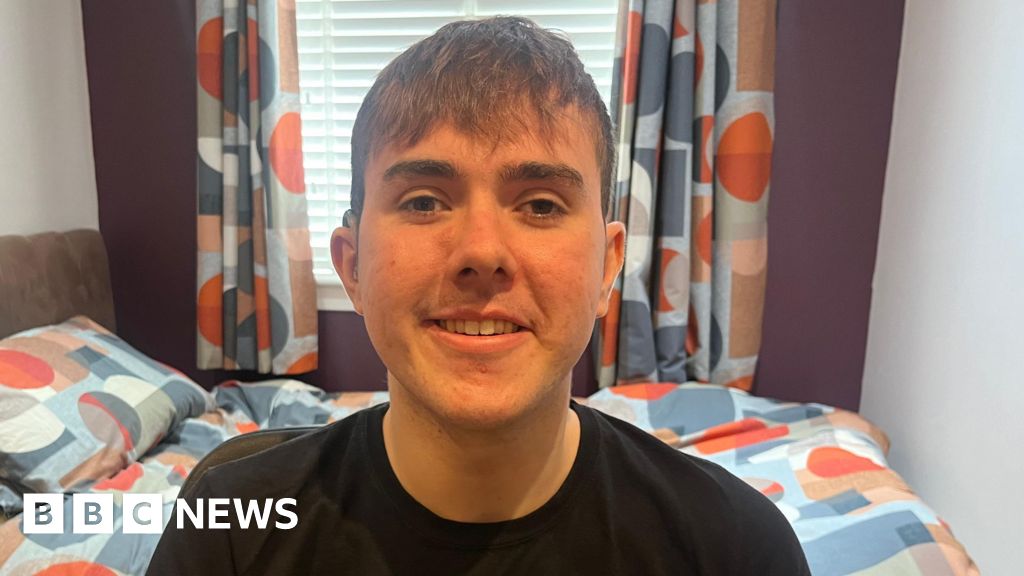Image caption Andrew Pettigrew is one of more than 30,000 deaf Scottish people.
39 minutes ago
Andrew Pettigrew is 22 years old and completely blind and deaf.
He relies on a cochlear implant to help him hear limited sounds, and despite the challenges of living with double sensory loss, he successfully graduated with a degree in English and Creative Writing from the University of Strathclyde.
He is now pursuing his dream of becoming a writer.
Andrew has succeeded despite being deaf and blind – disabilities that have never been recognised by the Scottish Government.
The charity Deafblind Scotland estimates that there are 34,000 deaf people in Scotland whose vision and hearing are both severely impaired and one cannot compensate for the other.
It can lead to serious communication problems and, in extreme cases, complete isolation.
Image caption: Josephine Owen says her son was isolated from his friends during his childhood
Instead of receiving the support they need for both their visual and hearing impairments, visually and hearing impaired patients are treated separately, which results in many needs going unmet.
There is no official data on the disease, so charities must estimate how many people are affected.
Andrew knows what it’s like to experience the isolation caused by hearing and vision impairments.
His mother, Josephine Owen, told BBC Scotland News: “It happened when he was still in primary school.”
“He was a kid with lots of friends and lots of activities. Suddenly kids didn’t know how to deal with that and they started distancing themselves.”
Josephine taught herself the Deaf Manual, a series of words and letters spelled out on the palm of a person’s hand.
She stressed the need for early intervention, saying her son was “always smart enough” to go to college but wouldn’t have been able to do so without help early in his education.
Andrew is keen to highlight the urgent need for Scotland to recognise hearing and vision impairments as distinct disabilities.
“I believe having a clear definition is the first step towards a more inclusive Scotland,” he said.
“Policies that support us must take into account the unique challenges we face due to both our visual and hearing impairments.”
Image caption: Isabella Goldie of the Scottish Association for the Deaf and Blind hopes change will come soon
Norway has been a leader in the certification of hearing and visual impairments since 1980. The Nordic definitions are recognised by the World Health Organisation (WHO) and accepted by experts working in the field.
England and Wales adopted definitions of hearing and vision impairment in 1995 and produced guidelines on care in 2014.
However, there has been no formal declaration or definition in Scotland, despite some efforts since shortly after the Scottish Parliament was re-established in Edinburgh in 1999.
“There is a lack of early detection and specialist services,” said Isabella Goldie, chief executive of the Scottish Deafblind Association.
“One of our members told us that he was waiting in two different queues – one for hearing support and one for visual support – and he didn’t understand how the two affected each other.”
In February, the Scottish Association for the Deaf and Blind and the Scottish Parliament’s cross-party group on deafness began gathering support for Scotland to adopt an official definition of deaf and blindness.
Goldie is hopeful that will change in the near future.
“We have received great support from MSPs and government officials and the evidence is clear that countries that have clear definitions of hearing and visual impairment provide better services,” she said.
“A better path to the future”
“If we’re going to provide people with the right services, we need to know who we’re talking about,” said Göran Forsgren, a hearing and visual impairment specialist at the Nordic Welfare Centre.
“Early intervention sets them on a better path forward.”
“The earlier you start and the more exposure you have to the language, the better the results are guaranteed,” he added.
A Scottish Government spokesman said: “We appreciate the work of the Scottish Parliament’s cross-party group on deafness, the Deaf & Blind Scotland Association and other members and stakeholders on the definition of deaf and blindness. We appreciate the strong feelings about the definition and will continue to work on this important issue.”
But for Andrew and thousands like him, this engagement is one they’ve been hoping for soon.
He says: “These disabilities overlap and make my life more difficult. Policy needs to reflect this, rather than treating vision and hearing impairments as separate issues.”

